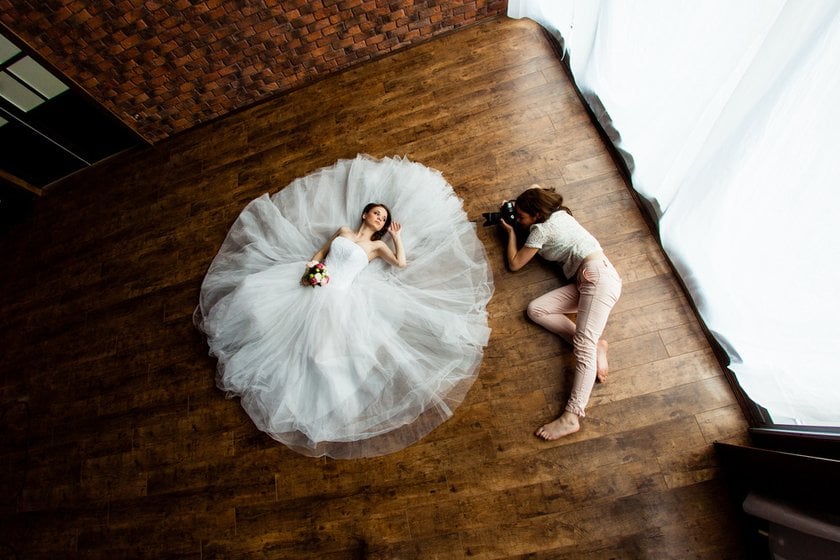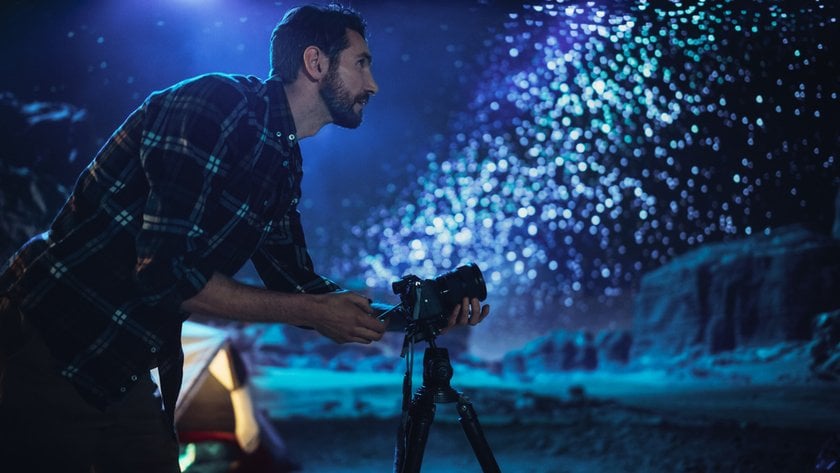December 09
23 min. to read
How Much Does a Photographer Make in 2026

You need photos everywhere, from magazines to events etc. The importance of images hasn’t reduced even though most people now carry their cameras. Still, you need professional photographers to click neat photos.
In this article, we'll discuss the photography profession and the role of modern photo editor tools in the industry. Let’s get it started!
What Is the Average Daily Income for Photographers
There cannot be one answer to this question as the amount of money you make depends on several factors, including:
Your Experience: Experienced photographers make more money. This works like any other business; the more experience you have, the more you can demand.
Nature of Photography: Photography is broken into different types, including, wildlife photography, wedding photography, etc. The amount of money a photographer makes largely depends on this factor.
Nature of Work: While it is easy to tell how much photographers make on a payroll, predicting a freelancer’s pay can be difficult. Since many photographers work as freelancers, much research had to be done to write this article.
How much can professional photographers make a year? It is typically estimated that they earn around $70,000. However, when discussing the earnings of photographers, it's essential to note the range. If you talk to different photographers, some might report making less, while others could earn considerably more. Let's delve further into this topic to understand the nuances.
The Most Lucrative Genre of Photography
Like any form of art, photography has its more commercially rewarding sides, and it's only sometimes what you might expect. To understand how much a photographer makes, you need to look at the genres of photography that typically command higher prices.
Wedding and Event Photography
A timeless niche, wedding photography has consistently remained one of the more profitable genres. The demand for high-quality photographers has skyrocketed with ceremonies and receptions becoming more elaborate. Remember, capturing the 'perfect moment' is crucial, and people are willing to pay top dollar. When considering photography prices, weddings often come out on top.
Commercial Photography
Big businesses, advertising agencies, and even startups need quality shots to promote their products. Be it for billboards or eCommerce websites, commercial photographers have a vast market to tap into. They often work with an online photo editor or AI photo editing tools to ensure the final image aligns with the brand's vision.
Wildlife Photography
Dream of capturing the majestic lion in its natural habitat or the elusive birds in mid-flight? How becoming a wildlife photographer can not only fulfill this dream but can also be a profitable venture. Magazines, documentaries, and online platforms always look for the next mesmerizing shot. However, this field requires patience, skill, and, sometimes, venturing into challenging environments.
Portrait and Fashion Photography
The glamour world is another sector where photographers can earn a handsome fee. Whether it's high-fashion shoots for renowned magazines or headshots for aspiring models, this genre combines creativity with commerce. With platforms like Instagram elevating the importance of quality shots, portrait photographers are in high demand.
In Which Locations Can Photographers Potentially Earn the Highest Income
The potential income for photographers isn't just influenced by the genre they specialize in, but also by where they choose to ply their trade. Different locations have varied demands for photography, influenced by factors such as the economy, local culture, and industries requiring photographic services.
Big Metropolitan Cities
With their pulsating energy and bustling industries, big cities often present numerous opportunities for photographers. Whether in New York, Paris, Tokyo, or London, these hubs are home to fashion industries and corporate headquarters and host numerous events, conventions, and cultural festivities. The sheer volume of potential clients in these cities often means photographers can charge higher rates.
Tourist Destinations
Places hotspots for tourists, such as Bali, Santorini, or the Maldives, have a high demand for photographers offering services like vacation photoshoots, hotel and resort photography, and destination weddings. Capturing someone's holiday or a beautiful resort for promotional materials can fetch a tidy sum.
Film and Entertainment Hubs
Locations such as Los Angeles, Bollywood in Mumbai, or Nollywood in Nigeria, where the entertainment industry thrives, often require photographers for movie stills, celebrity photoshoots, and red-carpet events. The glitz and glamour associated with these industries can translate into lucrative contracts for adept photographers.
Art and Cultural Hubs
Cities with a rich artistic and cultural history, like Florence, Venice, or Kyoto, offer unique opportunities for photographers. Art exhibitions, cultural festivals, and historic restorations often require specialized photography. These places value preserving their heritage, and photographers play an integral role.
Fast-Growing Economies
Emerging markets and cities experiencing rapid economic growth, such as Dubai, Shanghai, or São Paulo, present budding opportunities. As businesses grow and the middle class expands, the demand for professional photography services, from corporate events to personal photoshoots, often rises.
Potential Revenue Range for Photographers
The potential revenue for photographers can vary significantly based on several factors, such as experience, specialization, location, and market demand. Many wonder, "How much money does a photographer make a year?" To provide a clearer understanding, here's a comprehensive breakdown of the income landscape for photographers:
Entry-level or Hobbyist Photographers
Average Hourly Rate: $10 - $25
Annual Income Range: Up to $20,000
At this level, photographers often shoot for passion more than profit. They might take on small gigs and events or sell a few prints. Their primary income might come from other sources, and photography is an additional stream.
Amateur or Part-time Photographers
Average Hourly Rate: $25 - $75
Annual Income Range: $20,000 - $50,000
Amateur photographers typically have a better grasp of their equipment and some understanding of the business side. They might have an online portfolio, engage with clients, or even work weekends shooting weddings or events.
Semi-Professional Photographers
Average Hourly Rate: $75 - $150
Annual Income Range: $50,000 - $75,000
These photographers have often built a brand name in their niche. While they might have other income sources, a significant portion of their earnings comes from photography. Their clientele is more extensive, and they might even have a studio.
Professional Photographers
Average Hourly Rate: $150 - $300
Annual Income Range: $75,000 - $150,000
Professional photographers typically rely solely on their photography work for income. They might be staff photographers for major publications, run successful studios, or take on high-profile gigs. Their portfolio is vast, and their network is extensive.
Top-tier or Elite Photographers
Average Hourly Rate: $300 and above
Annual Income Range: $150,000 to potentially over $1 million
These are the crème de la crème in the photography world. They're often sought after for high-profile projects, celebrity shoots, international campaigns, and more. Some have exclusive contracts; others might even teach masterclasses, sell licensed prints, or publish books.
Advanced yet easy-to-use photo editor
Get Luminar Neo NowWhat Strategies Can Be Employed to Enhance a Photographer's Income
Navigating the world of photography requires not only talent with the lens but also a strategic approach to business. Many wonder, "How much does a professional photographer make?" The answer often depends on the strategies employed. Here are some potent strategies that can help photographers bolster their earnings and answer that very question:
Diversify Your Skill Set
While specialization can command higher prices, diversifying allows you to tap into multiple markets. This might mean doing portrait and event photography or branching into videography. The broader your skill set, the more opportunities you have to earn.
Offer Editing and Post-production Services
Post-production is a critical component of the photography process. You can diversify your revenue streams by offering additional services like retouching, color grading, or photo album creation. Being proficient in software tools is essential.
While many photographers debate the merits of Photoshop vs. Lightroom, newer software like Luminar Neo also makes waves with its advanced AI-driven features. Familiarizing yourself with these tools and understanding their relative strengths can enhance your service offerings and potentially increase your package rates.
Conduct Workshops and Tutorials
If you've gathered significant experience and knowledge in photography, why not share it? Organizing workshops, online classes, or YouTube tutorials can provide passive income. This not only positions you as an expert in the field but can also expand your network.
Sell Prints and Licenses
Platforms like 500px, Shutterstock, or even your website can be a venue for selling prints or licensing your photos. Whether it's a breathtaking landscape shot or a unique street photograph, there's a market for quality images.
Create Packages for Services
Instead of offering a la carte pricing, package your services. For instance, a wedding package might include pre-wedding shoots, the wedding day, and an album. Bundling services can sometimes be more appealing to clients and ensures you get multiple gigs from a single client.
Network and Collaborate
Building relationships with other professionals in the industry can open doors to more opportunities. This includes makeup artists, event planners, or even other photographers. Collaborations can introduce you to a new client base and offer fresh perspectives and ideas.
Optimize Online Presence
In today's digital age, a strong online presence is invaluable. Maintain an updated portfolio, engage with followers on social media, and consider investing in online marketing or SEO. The more visible you are online, the more likely clients will find you.
Seek Client Feedback and Referrals
Happy clients can be the best ambassadors for your work. Encourage satisfied clients to leave testimonials or reviews and to refer your services to others. Word of mouth can be powerful, especially in a personal service like photography.
What Kind of Education Is Recommended for Pursuing a Career in Photography
Embarking on a career in photography often starts with a passion for capturing visuals, but the field can be technically intricate and artistically profound. Hence, formal education can provide an aspirant with technical mastery, artistic insights, and a professional network.
Many institutions worldwide offer Bachelor of Fine Arts (BFA) in Photography programs. These undergraduate courses delve deep into the nuances of photographic techniques, history, and digital and darkroom processes. They help students build a strong portfolio while offering theoretical knowledge and critical thinking skills essential for conceptualizing and executing projects. Moreover, many programs incorporate business courses, preparing students for the entrepreneurial aspects of a photography career.
However, not all successful photographers hold degrees. Short-term courses or workshops can be equally beneficial. They provide hands-on experience and focus on portrait photography, photojournalism, or post-production tools like Photoshop and Lightroom. In today's age of digital media, there are also a plethora of online courses available. These can be especially useful for upgrading their skills or shifting careers. Remember, while education provides a strong foundation, continuous self-learning, practice, and real-world experience are equally, if not more, crucial in the ever-evolving world of photography.
Typical Costs Associated with Running a Photography Business
Launching and operating a photography business involves numerous upfront and recurring expenses. First and foremost are equipment costs. A professional-grade camera, multiple lenses to cater to various shooting scenarios, tripods, flash units, and possibly drone equipment can add up quickly. Investing in high-quality editing software and computer hardware is essential, ensuring that post-production work meets professional standards.
Beyond the immediate gear requirements, photographers must consider operational expenses. Rent for a studio or workspace, utilities, website hosting and maintenance, marketing and advertising, and insurance (both for equipment and potential liabilities) can all contribute to monthly outflows. Print materials, albums, and props are also expensive, especially for portrait or event photographers. As the business grows, photographers might also need to invest in hiring assistants or support staff, further adding to operational costs.
Lastly, it's crucial to account for ongoing professional development. The world of photography is ever-evolving, and staying updated with the latest techniques, equipment, and trends is paramount. This might mean enrolling in workshops, attending seminars, or buying books and online courses. There are also often-overlooked costs like travel (for location-based shoots), client entertainment or consultations, and potential legal fees associated with copyright issues or contract disputes. As with any business, budgeting wisely and regularly reviewing expenses can help a photography business thrive and remain profitable.
From Capturing Images to Making Money: Achieving Success as a Freelance Photographer
Success in freelance photography, much like in any art or business venture, isn't just about mastering the craft; it's also about understanding market dynamics, building relationships, and promoting oneself effectively. Here's a roadmap to transitioning from a budding photographer to a successful freelance professional:
1. Master Your Craft: Before anything else, ensure you have a firm grasp on the basics of photography. This involves understanding your equipment, studying light, composition, and honing your style. Whether through formal education, workshops, or self-study, continuous learning is key.
2. Develop a Unique Selling Proposition (USP): In a saturated market, what sets you apart? It might be a specific style, a niche you cater to (like underwater photography or urban landscapes), or even a unique post-processing technique.
3. Build a Portfolio: Create a collection of your best work. This serves as a visual resume, showcasing your skills and style to potential clients. Over time, refine and update this portfolio, ensuring it remains relevant.
4. Network Actively: Engage with fellow photographers, join local photography clubs, and attend industry events. Building relationships can lead to referrals, collaborations, and opportunities you might not have encountered otherwise.
5. Embrace the Digital Age: Create an online presence. This includes a professional website, active social media profiles, and a blog where you share insights, stories behind your photos, or industry trends. Use SEO techniques to make sure potential clients find you when they search online.
6. Pricing and Packages: Research what competitors are charging and develop pricing that reflects your skill level and allows you to cover your costs and earn a profit. Offering packages or bundled services can often be more attractive to clients.
7. Legalize and Insure: Ensure you have all necessary business licenses. Draft contracts for client engagements to protect both parties. Invest in insurance to cover your equipment and potential liabilities.
8. Diversify Income Streams: Besides traditional client bookings, consider selling prints, licensing your images, conducting workshops, or offering photo editing services to augment your income.
9. Seek Feedback: Regularly ask for feedback from clients and peers. Constructive criticism can be invaluable in helping you grow and refine your services.
10. Stay Adaptable: The world of photography is dynamic. New technologies, styles, and trends emerge regularly. Being adaptable and open to change can position you ahead of competitors.
While passion and skill are at the heart of photography, achieving financial success requires a mix of artistry, entrepreneurship, and perseverance. Every shutter click is a step forward. Stay dedicated, keep learning, and watch as your freelance photography career flourishes.
A 7-day Free Trial of Luminar Neo with No Obligation
Get it now!
FAQ
Do Photographers Earn a Substantial Income?
While some photographers earn a substantial income, especially those in specialized niches or with vast experience, many face competitive markets and fluctuating demand, leading to varying income levels. It's a mix of talent, marketing, networking, and sometimes luck that defines substantial earnings in this profession.
What Is the Earning Potential in Photography?
The earning potential in photography is vast, with factors like specialization, location, reputation, and market demand playing roles. While some photographers might earn modest amounts, others can command six-figure incomes, especially in commercial or high-demand niches.
Is It Possible for Photographers to Earn More Than $100,000?
Yes, photographers, especially those in commercial fields with a strong brand or working in lucrative niches, can earn more than $100,000 annually. However, this often requires consistent, high-quality work, excellent marketing, and a solid client base.
What Is the Typical Income for Wedding Photographers?
Wedding photographers often earn more than generalists due to the event-specific nature of their work. The average income for the photographer might be anywhere from $1,000 to $10,000 per wedding, depending on experience, reputation, and regional market rates.
What Is the Annual Salary Range for Photographers?
The salary range for photographers varies significantly, with starting photographers earning around $20,000 to $30,000 and seasoned professionals or those in high-demand areas earning upwards of $100,000 or more.
What Is the Average Earning of a Professional Photographer?
The average earnings of a professional photographer can differ based on specialization and market. In the U.S., as of the last data, the median annual wage was around $35,000 to $45,000, but this can be higher or lower based on the factors mentioned earlier.











 >
>

